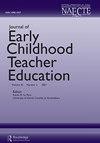Early childhood educators’ knowledge and attitudes about developmental screening for Autism Spectrum Disorder
IF 1.3
Q3 EDUCATION & EDUCATIONAL RESEARCH
Journal of Early Childhood Teacher Education
Pub Date : 2021-03-27
DOI:10.1080/10901027.2021.1902434
引用次数: 3
Abstract
ABSTRACT The importance of early intervention for developmental disabilities, such as Autism Spectrum Disorder, is increasingly recognized as critical to children’s later success, making it necessary to better understand how professionals who work regularly with young children view the use of developmental screening in their professional practice. This study examined knowledge and attitudes toward developmental screening practices among 130 early childcare and education providers. Survey methodology was used to collect and analyze information on providers’ perceptions of administering developmental screening, barriers to using screening in early childhood education settings, and differences in perceived barriers among providers with varying knowledge of autism spectrum disorder. Providers reported little knowledge of common screening tools but a willingness to use these tools if trained to do so. Ratings of perceived barriers to screening aligned with the behavior intentions and perceived behavioral control constructs of the Theory of Planned Behavior, illustrating reasons why providers may or may not view screening as feasible in their respective settings. Knowledge of Autism Spectrum Disorder was not related to perceived barriers to screening, suggesting that other factors need to be considered when designing early childhood screening programs. These and other implications are discussed in relation to future research and practice.幼儿教育工作者对自闭症谱系障碍发育筛查的认识和态度
自闭症谱系障碍等发育障碍的早期干预的重要性日益被认为对儿童日后的成功至关重要,因此有必要更好地了解经常与幼儿打交道的专业人员在其专业实践中如何看待发育筛查的使用。本研究调查了130名早期儿童保育和教育提供者对发育筛查实践的知识和态度。使用调查方法收集和分析有关提供者对管理发育筛查的看法、在幼儿教育环境中使用筛查的障碍以及不同自闭症谱系障碍知识的提供者之间感知障碍的差异的信息。提供者对常见的筛查工具知之甚少,但如果经过培训,他们愿意使用这些工具。对筛查的感知障碍的评级与计划行为理论的行为意图和感知行为控制结构相一致,说明了为什么提供者可能或可能不认为筛查在各自的环境中是可行的。对自闭症谱系障碍的了解与筛查的感知障碍无关,这表明在设计早期儿童筛查项目时需要考虑其他因素。这些和其他影响讨论了有关未来的研究和实践。
本文章由计算机程序翻译,如有差异,请以英文原文为准。
求助全文
约1分钟内获得全文
求助全文
来源期刊

Journal of Early Childhood Teacher Education
EDUCATION & EDUCATIONAL RESEARCH-
CiteScore
2.20
自引率
16.70%
发文量
27
期刊介绍:
The Journal of Early Childhood Teacher Education, the official journal of the National Association of Early Childhood Teacher Educators, publishes original manuscripts, reviews, and information about association activities. Its purpose is to provide a forum for consideration of issues and for exchange of information and ideas about research and practice in early childhood teacher education. JECTE welcomes research reports, position papers, essays on current issues, reflective reports on innovative teacher education practices, letters to the editor and book reviews.
 求助内容:
求助内容: 应助结果提醒方式:
应助结果提醒方式:


